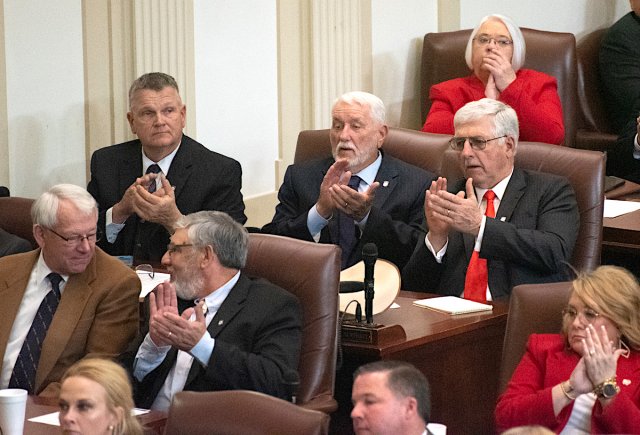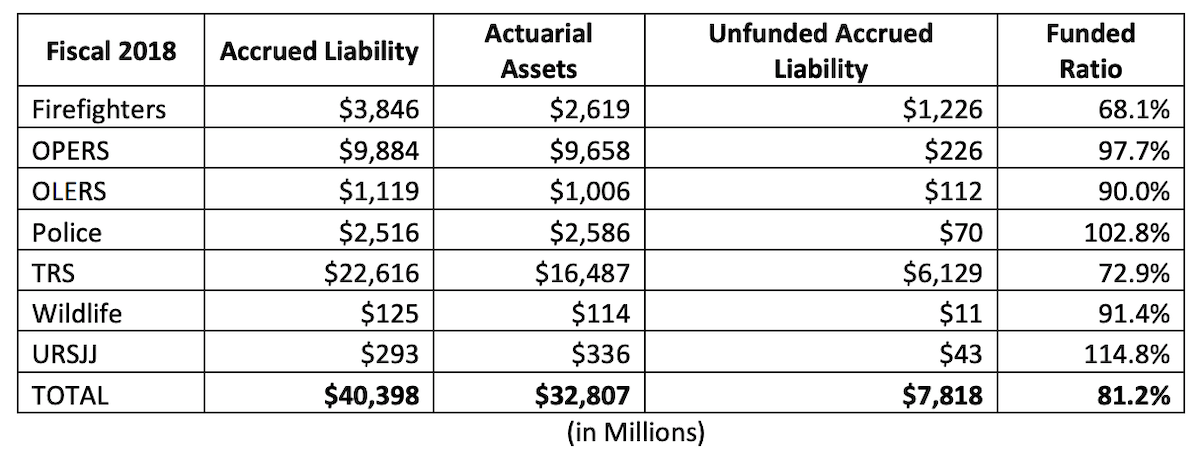

The Oklahoma State Senate sent a cost of living adjustment for retired state pension recipients to Gov. Kevin Stitt on Friday, May 15, marking the first time the state Legislature has passed a such an increase to monthly payments in more than 12 years. Stitt subsequently signed the measure on May 21.
“I believe that it is time that we take care of our retirees,” Senate Appropriations and Budget Chairman Roger Thompson (R-Okemah) said. “Whenever they retired, they expected us to be able to do it.”
After more than two hours of discussion and impassioned debate, the Senate passed HB 3350 by a 41-5 vote today. Defining itself as a “nonfiscal retirement bill,” the measure increases payments to retired teachers, firefighters, law enforcement, judges and other state employees out of the seven pension funds themselves and not with new appropriations, as some lawmakers desired.
HB 3350 will implement a 4 percent increase in monthly pension payments for those retired for five years or more as of July 1, 2020, and a 2 percent increase for those retired at least two years but not five years. Anyone retired for less than two years as of July 1, 2020, would receive no increase in their monthly pension payments. It also would include increases for retired volunteer firefighters.
For the past two sessions, HB 3350’s pension COLA faced a long and uncertain path, despite its strong support in a House of Representatives that advanced it by a 99-0 vote March 10. The bill’s stair-stepped approach to a pension COLA was called a “compromise” in late February.
But debate over its final approval in the Senate extended all the way to the evening of May 14, when GOP senators dominated Chic-Fil-A sandwiches in a caucus meeting and talked through some of the session’s final discussions. The pension COLA issue featured substantial discussion on potential reforms and other uncertainties, which spilled onto the Senate floor Friday morning.
“Is this enough?” Sen. Lonnie Paxton (R-Tuttle) asked Thompson.
Thompson read what he called “analytical data” before addressing Paxton’s concern about whether retirees will request another pension COLA soon.
“I am not able to see into the future,” Thompson said. “What I do understand is that this bill we have before us today addresses a real need in our retirement community. And today, we have a real opportunity to help those (Oklahomans).”
Pension politics exacerbated by COVID-19

Oklahoma’s pension systems have taken a beating both financially and politically in recent weeks. While exact figures are changing by the day with COVID-19-related stock market fluctuations, the pension fund investments “are down,” Thompson told media earlier this month.
On the Senate floor, Paxton read a letter from Teachers’ Retirement System of Oklahoma director Tom Spencer that said his pension fund is down $1 billion since June 30, 2019. Paxton said Spencer wrote that the economic fluctuations have already dropped the TRS funding ration from 72.9 percent to about 64 percent.
“That does not include the COLA,” Paxton said.
Thompson stood firm that retirees “standing in need” will benefit from additional money in their monthly checks, even as some have argued the pension COLA is not large enough.
“It’s only going to get them $50 to $100? These people I know, $50 to $100 is huge to them,” Thompson said. “They are at a point in their lives that they are not able to go out and work, and it is our duty to make sure they are taken care of.”
Thompson and other lawmakers have also pushed back against Stitt’s narrative that their budget agreement for Fiscal Year 2021 will hurt the pensions further. The governor vetoed two bills that temporarily lower the apportioned percentages of sales, use and income taxes sent into the pension systems.
“We have made progress shoring up our pension systems in the last few years, now is not the time to harm that progress,” Stitt said in a combination of press briefings earlier this week. “Right now is the time — with the stock market drop — that you need to be investing.”
The Legislature overrode the Stitt vetoes, using fiery floor discussion to push back on the governor’s claims that had led to Oklahomans calling lawmaker offices to bemoan pension cuts that are not actually happening.
“It really grieves me to ask these questions, as the governor and his budget director are personal friends. but you also know I like accuracy,” Rep. Mark Lepak (R-Claremore) said on the House floor Wednesday. “How much money is being taken out of the pension in this budget?”
House Appropriations and Budget Chairman Kevin Wallace (R-Wellston) replied simply: “Zero.”
Friday, Thompson noted the Legislature’s 2003 decision to direct “off the top” dollars to the pension funds, which featured low funding ratios.
“The state itself over the last few years has contributed an extra $5.6 billion into those systems from FY 2006 to FY 2019,” Thompson said.
Sen. Julie Daniels (R-Bartlesville) said those contributions came from the taxes of more people than just state retirees, and she said they are hurting as well amid the pandemic.
“Lots of people in this state are hurting right now. Lots of people hurt all the time,” Daniels said. “But I’m not going to go back to what I consider an irresponsible practice while I want on reform.”
In front of a gallery full of socially distanced, mask-wearing and armed law enforcement officers, Sen. Ron Sharp (R-Shawnee) debated in favor of the bill.
“Show some dignity yourself and provide this pay for our helpers,” said Sharp, a retired teacher himself. “Inflation has went up in the last 11 years 23 percent since these retirees have had a COLA.”
After Paxton debated against the bill, Sharp apologized and said he meant to ask his colleagues “to show these individuals dignity.”
Sen. Marty Quinn (R-Claremore) said he did not want to offend anyone either, but he said the Legislature was making a mistake.
“I’m not going to crawl under a rock and ignore the financial mistakes that continue to be made in this body and by other bodies so that people will like me,” Quinn said. “I didn’t come down here to be liked.”
Quinn emphasized his belief that the pension systems need to be reformed to protect taxpayers. Until that is done, he said a pension COLA is not appropriate.
“Sixty-eight percent isn’t fully funded, and 72 percent isn’t fully funded,” he said. “And why in the world are we funding a system that is 114 percent funded? The reason is because we haven’t had the political courage to separate them out.”
Quinn said he looks forward to next session when his colleagues have pledged to look at reforming the seven pension systems.
“We are going to see how stiff that backbone is,” Quinn said.
Minutes later, Quinn screamed into the microphone while discussing private sector workers and low-income people who do not have pensions. Floor Leader Kim David (R-Porter) emerged and placed her shoulder on Quinn, who calmed and continued his remarks while choking back his emotions.
In announcing he had signed the pension COLA measure, Stitt noted that it becomes effective immediately.
“I am proud to support our first responders, teachers and state employees with this needed increase,” Stitt said in a press release. “I told Oklahomans on the campaign trail that I would work to get this across the finish line, and I am delivering on my promise.”
(Update: This story and its headline were updated at 10:30 a.m. Thursday, May 21, to note Gov. Kevin Stitt had signed the bill.)




















